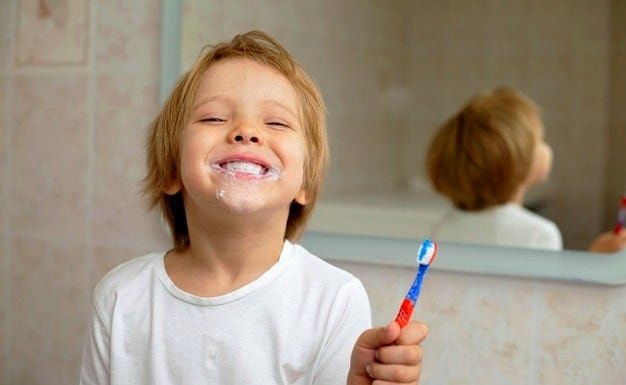Withbad breathWhat should we do about kids?
We all know that consuming garlic andonionsis a significant factor in causing bad breath in adults and it’s commonly recommended to fix it by chewing gum,using mouthwashand brushing teeth. Unfortunately, when a child’s mouth has bad breath, these methods are usually ineffective.In most cases
bad breath in kidsmay relate to what they have eaten recently, but if this bad breath persists for more than a day, it can worry parents.Causes of Bad Breath in Children
There are numerous factors that cause bad breath in children. Some of these issues can be resolved at home, while others may indicate more serious conditions requiring a visit to the dentist. Some of these factors include:
Consumption of smelly foods:
This is the most common cause of bad breath. If a child enjoys spicy foods like garlic and onions, they may cause bad breath after digestion in the gastrointestinal tract.
Poor oral hygiene:
The human mouth is full of bacteria, and children are no exception. These bacteria interact with leftover food particles
in the gums, tongue, teeth, and tonsils of the child, leading to bad breath.Dry mouth:

If a child has a stuffy nose, it can lead to mouth breathing difficulties. In this situation, bacteria grow and lead to bad breath.Abscesses, cavities, and tartar buildup:
Each of these can cause bad breath.
Presence of foreign objects:
Anything that gets stuck in a child’s mouth can cause discomfort and bad breath. Some of these issues may arise due to their medical condition.
Allergies and
colds:
Excess mucus promotes bacteria growth, leading to bad breath.Sinus infection:This occurs when fluids accumulate in the nasal area and drain down the throat.
Poor dental care:
Poor care can lead to tooth decay, even if a child has only a few teeth.
Enlarged tonsils:
Bacteria can accumulate in the tonsil crevices alongside food, causing bad breath.
Gastroesophageal reflux disease:
:
This condition occurs when stomach acids bubble up, causing an acidic smell.
What to Do About a Child’s Bad Breath?In many cases, children’s bad breath can be treated with simple solutions and home remedies such as:After each meal and before bedtime, clean the child’s tongue and gums using a soft toothbrush. Using toothpaste is also a good option.
Ensure the child’s hands, pacifiers, and toys are thoroughly washed, as this controls any remaining dry bacteria.

Tips for preventing and eliminating bad breath:
As mentioned in the beginning of this section from
- SelMagz
- since most cases of bad breath in children stem from poor dental hygiene, it’s important to teach them how to take care of their teeth:
Brush the child’s teeth twice a day for two minutes and rinse their mouth after every meal. You can play their favorite song or cartoon while they brush to help them reach the two-minute mark. If the child is able, let them choose their own toothbrush.
Ask your child’s dentist to recommend an appropriate mouthwash for them.Teach the child how to usedental floss.
- The child should clean their tongue properly, as most bacteria accumulate on the tongue and cause bad breath. There are toothbrushes on the market designed to cleanse the tongue effectively.
- Keep the child hydrated since increased saliva production reduces the chances of dry mouth.
- Provide a healthy, balanced diet low in sugar for the child.Regularly clean any dental implants or prosthetics the child may have.Do not forget about regular dental check-ups for your child, as sometimes treatment for bad breath goes beyond what you can manage and can be a serious sign.
- Discourage bad habits in your child, as certain incorrect habits like thumb sucking, chewing, and sucking on objects can cause bad breath.
- Some natural remedies for bad breath:
- While there is no substitute for brushing and flossing, you can minimize your child’s bad breath by doing the following:
- Keep your child hydrated
- Change your child’s toothbrush every two to three months
- Mix one cup of water

baking soda
and add peppermint oil to create a mouthwash for the child, but remind them not to swallow it while using.
- Natural remedies are excellent for easing bad breath, but it’s vital to remember these are not definitive treatments. If your child’s bad breath is a sign of gum disease or other medical conditions like infection, plaque or tartar, these remedies will not effectively eliminate the issue; they only mask the odor somewhat. When a real medical condition exists, the only solution is to visit the dentist regularly.
- If you suspect your child’s bad breath is due to their sleeping habits, help them with this. While you cannot fully treat bad breath at home, you can get a humidifier for their room to add moisture to the air.
- Increasing moisture helps combat dry mouth. You can also encourage children to try different sleeping positions, and as long as they are not prone to nighttime accidents, let them drink a cup of water if they wake up.Conclusion:Oral hygiene is extremely important for everyone, especially for growing children. Teaching kids a proper oral care routine is essential.
Common Questions and Answers:
1. Why does my child have bad breath even after brushing their teeth?
Most children do not know how to clean their teeth effectively. They should brush for a minimum of two minutes and clean all areas of their teeth and tongue.
2. Why are children more prone to bad breath than adults?
Children tend to sleep more than adults, which helps the bacteria in their mouths to thrive.
3. Does bad breath in children relate to
diabetes?
While this is not true for everyone, yes, bad breath is associated with diabetes but it can also relate to several other illnesses.
Children’s oral hygiene
Treatment for bad breath in children
Children’s gastroesophageal refluxStomach issues causing children’s bad breathBrushing children’s teeth
Ways to eliminate a child’s bad breath







